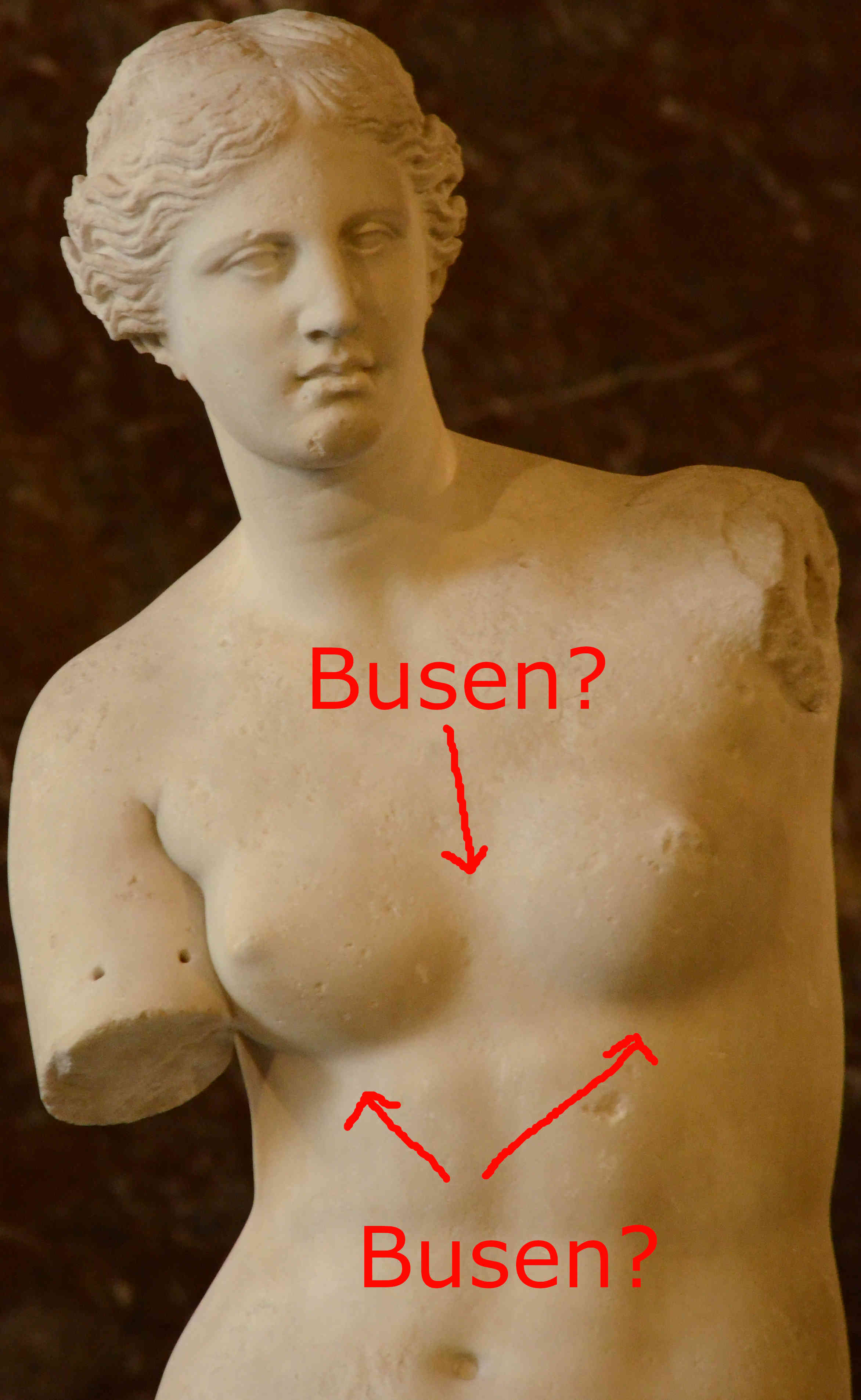The word Busen refers to terms we all agree on
- the female breasts (Busen)
- a bay (Meerbusen)
Then some you might have heard from
- the human breast area in general (Brust)
- the human inner breast where feelings arise
- the area between the (female) breasts
And some you might have never heard from
- a fold in the upper part of clothing (Falte im Oberteil eines Gewandes) used for transportation or storing personal items - there are a lot of examples in the bible
- shirt collar (Hemdkragen)
- lap, in the meaning of the area on top of the thighs of a sitting person (Schoß)
Just to name a few.
All of these definitions can be found in the Deutsches Wörterbuch von Jacob Grimm und Wilhelm Grimm. But it says nothing about 5. the area between the (female) breasts. Can we say Busen doesn't denote the area between the breasts?
Let's take a deeper look.
One way is to look for historic examples where someone refers to the area between the breasts as Busen.
[...] und gab es dem Weib, so wie ich auch die übrigen [Eier], die ich sorgfältiger geöffnet hatte, meinen übrigen Mägden gab, sie in ihren Busen zwischen den Brüsten bis zur Zeit des Ausschliesens zu erwärmen.
source: Der Römisch-Kaiserlichen Akademie der Naturforscher auserlesene medizinisch-chirurgisch-anatomisch-chymisch- und botanische Abhandlungen, Band 20 from 1771
Will it be so easy? Unfortunately I don't think so. I'm pretty sure the author refers to 6. a fold in the upper part of your clothing, where he told his maiden to put the eggs, so they are warm and can hatch.
Ok next, at least there is one thing we can say so far: Anatomists do say Busen, when they are refering to the area between the female breasts, as anatomists Helmut Wicht is quoted in this blog entry and there are a lot of other online dictionaries, where we can find this.
Anatomists call the area between the female breasts
Sinus mammarum (old)
Sinus intermammarius
Sulcus intermammarius
or sometimes just short
Sinus
Sulcus
where Sinus can be translated as
Bauch, Tasche, Bucht (paunche/bulge, pocket, bay)
and Sulcus as
Rille (groove)
But OMG! Wait a minute and let's go back to Grimm's Wörterbuch. Right there ... in the very first line
busen, m. sinus, κόλπος, sl. nadro, njedra, ahd. puosum (Graff 3, 218)
Is Busen for the area between the female breasts no more than a direct translation of the latin word Sinus, which is short for Sinus intermammarius/mammarum the anatomical name for the area between the female breasts? It makes sense.
Also, Helmut Wicht assumes, that it all started with the book Die alten deutschen Kunstwörter der Anatomie, because it's the root for a lot of Eindeutschungen. But I'm not sure about it, but take a look for yourself. But if it is true and the new meaning established around 1890 it wouldn't be found in the (earlier) Grimm's Wörterbuch.
Conclusion:
I think it's perfectly fine to say that the word Busen is referring to the area between the female breasts and no one will doubt it refers also to the female breasts. And even if I'm wrong with this derivation, anatomists are saying it anyway.
Fun fact: According to Grimm's DWB when talking about breasts Busen always refers to both breasts and the plural Busen refers to the breasts of multiple women.

